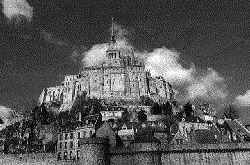
 |
Mont Saint Michel! |
Confession and Sin
Catholic: The Church believes that with proper confession, baptism, and
penitence, a person may be cleaned of sin. Some in the Church
(particularly the Jesuit order) tend to give light penance (often little
more than saying a certain number of Hail Marys). Such simple penance
remains sufficient, in most clerics' views, for minor transgressions.
However, when very serious sins are committed (murder, adultery, idolatry,
betrayal) most Catholic confessors will prescribe more serious penance.
One confessor might ask a thief to donate to the church; another confessor
might prescribe 5 years in servitude to the Church for one who had
consorted with spirits; another confessor might instruct a murderer to
devote his life to raising the orphan of his victim. The Catholic Church
also issues Indulgences -- writs by the pope, entitling one to forgiveness
for a specific sin which might be necessary for the security of the State.
Protestant: Persons are innately sinful, and may only be cleaned of sin at
God's will. Many Protestants are happy to help this process along,
though; exacting public confessions and penance, so that the sinner may
have an easier path to receiving God's grace. The common use of
Indulgences was one of the factors motivating the Protestant Reformation;
all Protestants abhor the notion of buying and selling God's forgiveness.
Free Will
Catholic: In order to share in the act of Creation, and be more like God,
God allows us each a measure of Free Will, with which we may chose to
accept or reject His teachings.
Protestant: All things are the will of God. Even the sinner sins because
it is God's will.
Language
Catholic: The liturgy should remain in the language of the mother church
(Latin, occasional Greek and Hebrew). The learned priest may then
interpret the word of God for the people.
Protestant: Each person should interpret the gospel for him or her self.
To this end, the sacraments should be given in the language common to the
area, and translations of the bible made available.
Marriage
Catholic: Divorce is not allowed except in one, very particular instance;
when a heathen couple marries and, later, one partner converts to
Christianity, a divorce is allowed (the new Christian has been reborn). A
priest should remain celibate, and should not marry; however, marriage is
preferable to sex without marriage, so some priests do marry (usually only
parish priests).
Protestant: Under certain circumstances, divorce is allowable. A priest
should be allowed to marry.
Papacy
Catholic: The Pope is infallible, and speaks for God on Earth.
Protestant: God speaks to people through revelation; He has no need for
an Earthly spokesman.
Relations with the state
Catholic: The state and the church are separate. Each serves God in its
own way. The two have separate and distinct hierarchies in order that the
aims of each might be better served.
Protestant: The church should be subservient to the state. The entire
people, as represented by their government, should be Christian and
worship God. With a Christian populace, the church should serve god
through the state.
Saints
Catholic: The Catholic church has long accepted the elevation of Saints by
a sort of popular will, or consensus. However, over the past twenty years
or so, the process of elevation to Sainthood has been centralized and
formalized in the Vatican. Now, miracles and faith must be proven for
beatification (in a debate between the would-be saint's proponents and the
Devil's advocate), and further miracles for sainthood, before the Pope
will recognize a saint.
Protestant: Most Protestants do _not_ like the polytheism associated with
Sainthood. However, this view is not universal. The Anglican church
continues to support the concept of popular Sainthood; though some of the
Roundheads and Puritans (English Protestant radicals) object strenuously.
See what Martin Luther has to say!
This game is a Subterranean Homesick Games production.